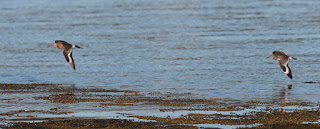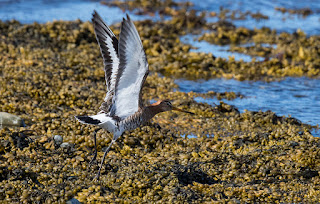After supper on 10 June Tony Dunne noticed a strange looking shorebird standing with a yellowlegs at "boat harbour" in Renews. A relative of Tony's secured a picture which he then gave to Clara Dunne who then forwarded the picture for me to identify. I always look forward to opening a picture of something the Dunnes of Renews can't identify. Everything rare happens in Renews. Once again it was a nice rarity. It was a Black-tailed Godwit - a surprise in June.
Black-tailed Godwit has become a very regular Icelandic vagrant to Newfoundland in late April and May. This spring there had already been one in The Goulds and another in central Newfoundland at Buchans of all places. Black-tailed Godwits must be going through a population increase in Iceland to account for the increased regularity of them in Newfoundland over the last 5-10 years.
Early the next morning I left St. John's to go look at the bird. There was enough daylight before 9 am to see the bird and get back to town in time for 9 am start time at the office. I arrived in Renews at 6 am and soon ran into Bill MacKenzie who had already checked the main beach with no success. We drove around to the town side of the harbour and found the local Willet, a late migrant Black-bellied Plover, several Greater Yellowlegs and a number of Spotted Sandpipers. By 6:40 there was no place left to look and we'd had enough of looking at the present shorebirds when the godwit sailed in from above. The orange neck, brilliant white under wings and black tail all obvious as it came in for the landing. BINGO.
The brilliant early morning sun was totally in our favour for looking at the bird. There is something special about that patented shade of bright orange on the bill and breast that is unique to Black-tailed Godwit and brings a warming to the rarity storage section of the heart no matter how many you see. We watched the bird probing around the kelp covered rocks in the falling tide and were taking pictures from within our cars. It was working it wat closer to us. Great views. I didn't know this at the time but the camera was having trouble focusing on the bird. The brilliant low morning sun was reflecting off the bird in a blinding light. Even though the centre focus spot was fully covered by the bird, the camera was focusing on the dark, light absorbing kelp just behind the bird. While 90% of the photos were not in focus 10% were and they came out OK.
During the 40 minutes of observation the local Willet chased the godwit three times. It would run at it. The godwit would at first just keep ahead of the charging Willet by running or with brief flights. But in the end the godwit flew away. We lost sight of it flying across the harbour. And from what following people said it seemed the godwit did not come back until late in the day. There has been a lone Willet spending the summer at Renews for more than ten years. For a couple of years it had a mate and on a least one year produced young that I do no think reach fledgling age. Newfoundland is east of the Willets main nesting range in Nova Scotia. This outlier that keeps coming back to Renews with high hope is like the lonely bull. It dreams of bliss but is frustrated year after year. It probably considered a shorebird larger than itself but with a wing stripe to match as potential competition lest a mate did come around.
The Black-tailed Godwit at Renews, Newfoundland on 11 June 2019. Age and Sex? The relatively short bill should indicate male and the limited amount of orange on breast should indicate female or maybe it is a sub-adult 1st year male. Speculating.
The immaculate white underwings are more startling white than any other shorebird.
The Black-tailed Godwit on the left is being hurried out of town by the Willet. Note the similar white wing stripes. The Willet is not used to seeing a wing stripe rivaling its own.
Don t mess with me! The Renews Willet. BossBird of the Renews tidal flats late May to August.
A picture of the Goulds Black-tailed Godwit on 28 April 2019. This must be an adult male. Note the intense colouring of the head and neck













just gorgeous never seen one would love to
ReplyDelete